Analysis: Cultural Diversity Impact in Multinational Corporations
VerifiedAdded on 2022/07/21
|6
|1960
|47
Essay
AI Summary
This essay delves into the significant impact of cultural diversity within multinational corporations (MNCs), examining its benefits and challenges. The introduction highlights the increasing importance of diversity in a globalized world, emphasizing the need for organizations to manage diverse workforces effectively. The essay explores why workplace diversity is crucial, citing the advantages of diverse perspectives, innovation, and improved communication in the global market. It also addresses the challenges of integrating diverse teams, such as overcoming cultural biases and stereotypes. The essay concludes by emphasizing the strategies used by thriving MNCs to foster inclusive environments, promote open communication, and implement conflict management strategies. The essay provides a comprehensive overview of the subject, supported by references to relevant academic research and real-world examples.
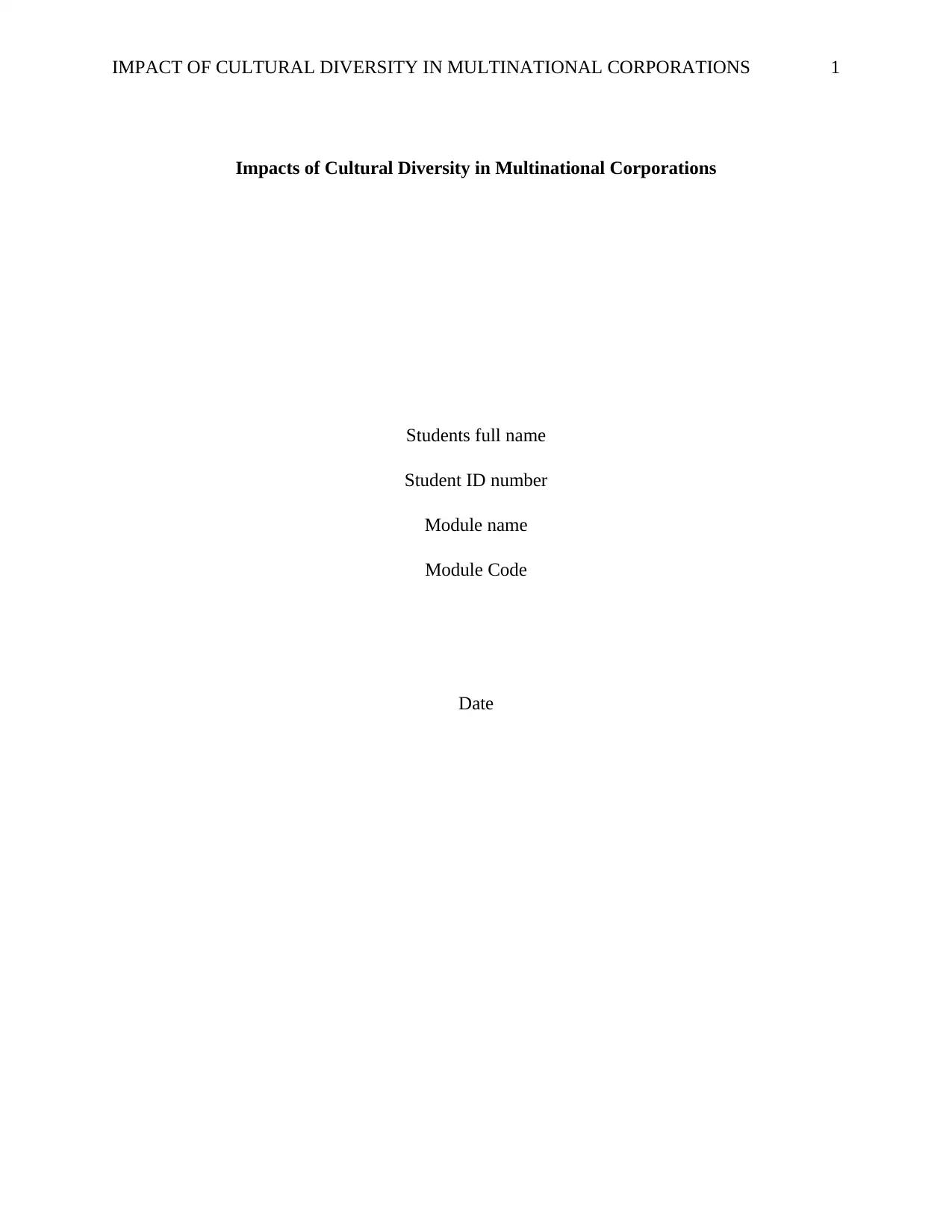
IMPACT OF CULTURAL DIVERSITY IN MULTINATIONAL CORPORATIONS 1
Impacts of Cultural Diversity in Multinational Corporations
Students full name
Student ID number
Module name
Module Code
Date
Impacts of Cultural Diversity in Multinational Corporations
Students full name
Student ID number
Module name
Module Code
Date
Paraphrase This Document
Need a fresh take? Get an instant paraphrase of this document with our AI Paraphraser
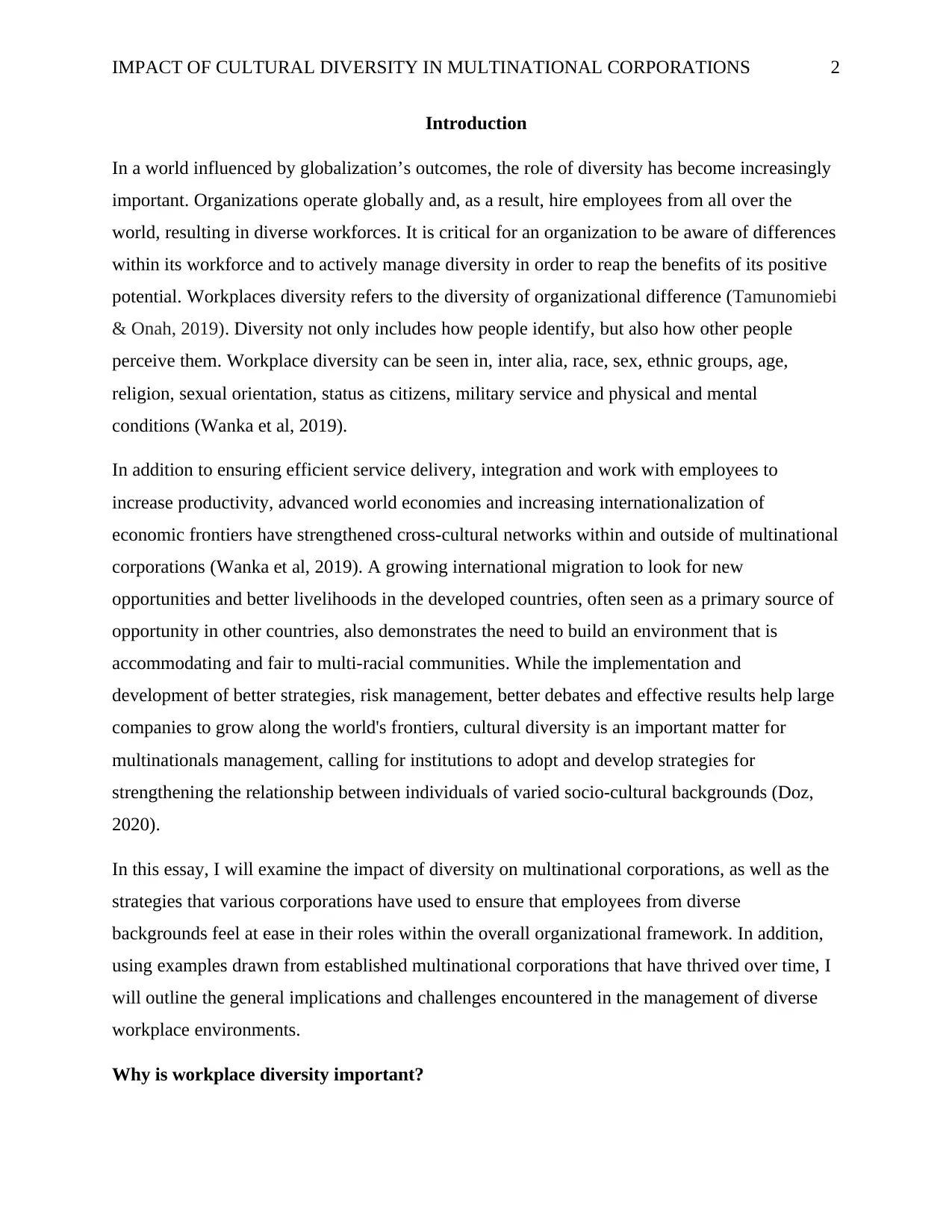
IMPACT OF CULTURAL DIVERSITY IN MULTINATIONAL CORPORATIONS 2
Introduction
In a world influenced by globalization’s outcomes, the role of diversity has become increasingly
important. Organizations operate globally and, as a result, hire employees from all over the
world, resulting in diverse workforces. It is critical for an organization to be aware of differences
within its workforce and to actively manage diversity in order to reap the benefits of its positive
potential. Workplaces diversity refers to the diversity of organizational difference (Tamunomiebi
& Onah, 2019). Diversity not only includes how people identify, but also how other people
perceive them. Workplace diversity can be seen in, inter alia, race, sex, ethnic groups, age,
religion, sexual orientation, status as citizens, military service and physical and mental
conditions (Wanka et al, 2019).
In addition to ensuring efficient service delivery, integration and work with employees to
increase productivity, advanced world economies and increasing internationalization of
economic frontiers have strengthened cross-cultural networks within and outside of multinational
corporations (Wanka et al, 2019). A growing international migration to look for new
opportunities and better livelihoods in the developed countries, often seen as a primary source of
opportunity in other countries, also demonstrates the need to build an environment that is
accommodating and fair to multi-racial communities. While the implementation and
development of better strategies, risk management, better debates and effective results help large
companies to grow along the world's frontiers, cultural diversity is an important matter for
multinationals management, calling for institutions to adopt and develop strategies for
strengthening the relationship between individuals of varied socio-cultural backgrounds (Doz,
2020).
In this essay, I will examine the impact of diversity on multinational corporations, as well as the
strategies that various corporations have used to ensure that employees from diverse
backgrounds feel at ease in their roles within the overall organizational framework. In addition,
using examples drawn from established multinational corporations that have thrived over time, I
will outline the general implications and challenges encountered in the management of diverse
workplace environments.
Why is workplace diversity important?
Introduction
In a world influenced by globalization’s outcomes, the role of diversity has become increasingly
important. Organizations operate globally and, as a result, hire employees from all over the
world, resulting in diverse workforces. It is critical for an organization to be aware of differences
within its workforce and to actively manage diversity in order to reap the benefits of its positive
potential. Workplaces diversity refers to the diversity of organizational difference (Tamunomiebi
& Onah, 2019). Diversity not only includes how people identify, but also how other people
perceive them. Workplace diversity can be seen in, inter alia, race, sex, ethnic groups, age,
religion, sexual orientation, status as citizens, military service and physical and mental
conditions (Wanka et al, 2019).
In addition to ensuring efficient service delivery, integration and work with employees to
increase productivity, advanced world economies and increasing internationalization of
economic frontiers have strengthened cross-cultural networks within and outside of multinational
corporations (Wanka et al, 2019). A growing international migration to look for new
opportunities and better livelihoods in the developed countries, often seen as a primary source of
opportunity in other countries, also demonstrates the need to build an environment that is
accommodating and fair to multi-racial communities. While the implementation and
development of better strategies, risk management, better debates and effective results help large
companies to grow along the world's frontiers, cultural diversity is an important matter for
multinationals management, calling for institutions to adopt and develop strategies for
strengthening the relationship between individuals of varied socio-cultural backgrounds (Doz,
2020).
In this essay, I will examine the impact of diversity on multinational corporations, as well as the
strategies that various corporations have used to ensure that employees from diverse
backgrounds feel at ease in their roles within the overall organizational framework. In addition,
using examples drawn from established multinational corporations that have thrived over time, I
will outline the general implications and challenges encountered in the management of diverse
workplace environments.
Why is workplace diversity important?
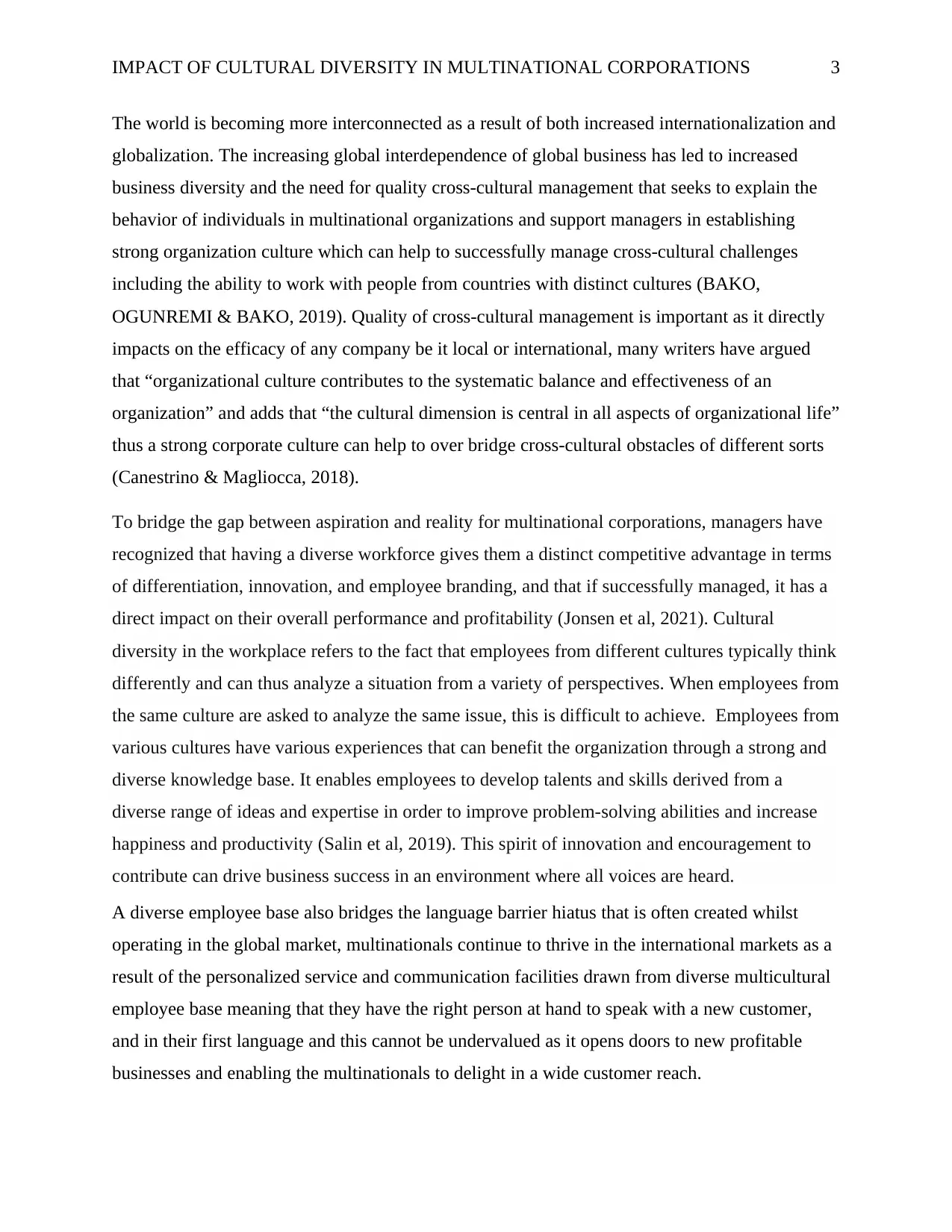
IMPACT OF CULTURAL DIVERSITY IN MULTINATIONAL CORPORATIONS 3
The world is becoming more interconnected as a result of both increased internationalization and
globalization. The increasing global interdependence of global business has led to increased
business diversity and the need for quality cross-cultural management that seeks to explain the
behavior of individuals in multinational organizations and support managers in establishing
strong organization culture which can help to successfully manage cross-cultural challenges
including the ability to work with people from countries with distinct cultures (BAKO,
OGUNREMI & BAKO, 2019). Quality of cross-cultural management is important as it directly
impacts on the efficacy of any company be it local or international, many writers have argued
that “organizational culture contributes to the systematic balance and effectiveness of an
organization” and adds that “the cultural dimension is central in all aspects of organizational life”
thus a strong corporate culture can help to over bridge cross-cultural obstacles of different sorts
(Canestrino & Magliocca, 2018).
To bridge the gap between aspiration and reality for multinational corporations, managers have
recognized that having a diverse workforce gives them a distinct competitive advantage in terms
of differentiation, innovation, and employee branding, and that if successfully managed, it has a
direct impact on their overall performance and profitability (Jonsen et al, 2021). Cultural
diversity in the workplace refers to the fact that employees from different cultures typically think
differently and can thus analyze a situation from a variety of perspectives. When employees from
the same culture are asked to analyze the same issue, this is difficult to achieve. Employees from
various cultures have various experiences that can benefit the organization through a strong and
diverse knowledge base. It enables employees to develop talents and skills derived from a
diverse range of ideas and expertise in order to improve problem-solving abilities and increase
happiness and productivity (Salin et al, 2019). This spirit of innovation and encouragement to
contribute can drive business success in an environment where all voices are heard.
A diverse employee base also bridges the language barrier hiatus that is often created whilst
operating in the global market, multinationals continue to thrive in the international markets as a
result of the personalized service and communication facilities drawn from diverse multicultural
employee base meaning that they have the right person at hand to speak with a new customer,
and in their first language and this cannot be undervalued as it opens doors to new profitable
businesses and enabling the multinationals to delight in a wide customer reach.
The world is becoming more interconnected as a result of both increased internationalization and
globalization. The increasing global interdependence of global business has led to increased
business diversity and the need for quality cross-cultural management that seeks to explain the
behavior of individuals in multinational organizations and support managers in establishing
strong organization culture which can help to successfully manage cross-cultural challenges
including the ability to work with people from countries with distinct cultures (BAKO,
OGUNREMI & BAKO, 2019). Quality of cross-cultural management is important as it directly
impacts on the efficacy of any company be it local or international, many writers have argued
that “organizational culture contributes to the systematic balance and effectiveness of an
organization” and adds that “the cultural dimension is central in all aspects of organizational life”
thus a strong corporate culture can help to over bridge cross-cultural obstacles of different sorts
(Canestrino & Magliocca, 2018).
To bridge the gap between aspiration and reality for multinational corporations, managers have
recognized that having a diverse workforce gives them a distinct competitive advantage in terms
of differentiation, innovation, and employee branding, and that if successfully managed, it has a
direct impact on their overall performance and profitability (Jonsen et al, 2021). Cultural
diversity in the workplace refers to the fact that employees from different cultures typically think
differently and can thus analyze a situation from a variety of perspectives. When employees from
the same culture are asked to analyze the same issue, this is difficult to achieve. Employees from
various cultures have various experiences that can benefit the organization through a strong and
diverse knowledge base. It enables employees to develop talents and skills derived from a
diverse range of ideas and expertise in order to improve problem-solving abilities and increase
happiness and productivity (Salin et al, 2019). This spirit of innovation and encouragement to
contribute can drive business success in an environment where all voices are heard.
A diverse employee base also bridges the language barrier hiatus that is often created whilst
operating in the global market, multinationals continue to thrive in the international markets as a
result of the personalized service and communication facilities drawn from diverse multicultural
employee base meaning that they have the right person at hand to speak with a new customer,
and in their first language and this cannot be undervalued as it opens doors to new profitable
businesses and enabling the multinationals to delight in a wide customer reach.
⊘ This is a preview!⊘
Do you want full access?
Subscribe today to unlock all pages.

Trusted by 1+ million students worldwide
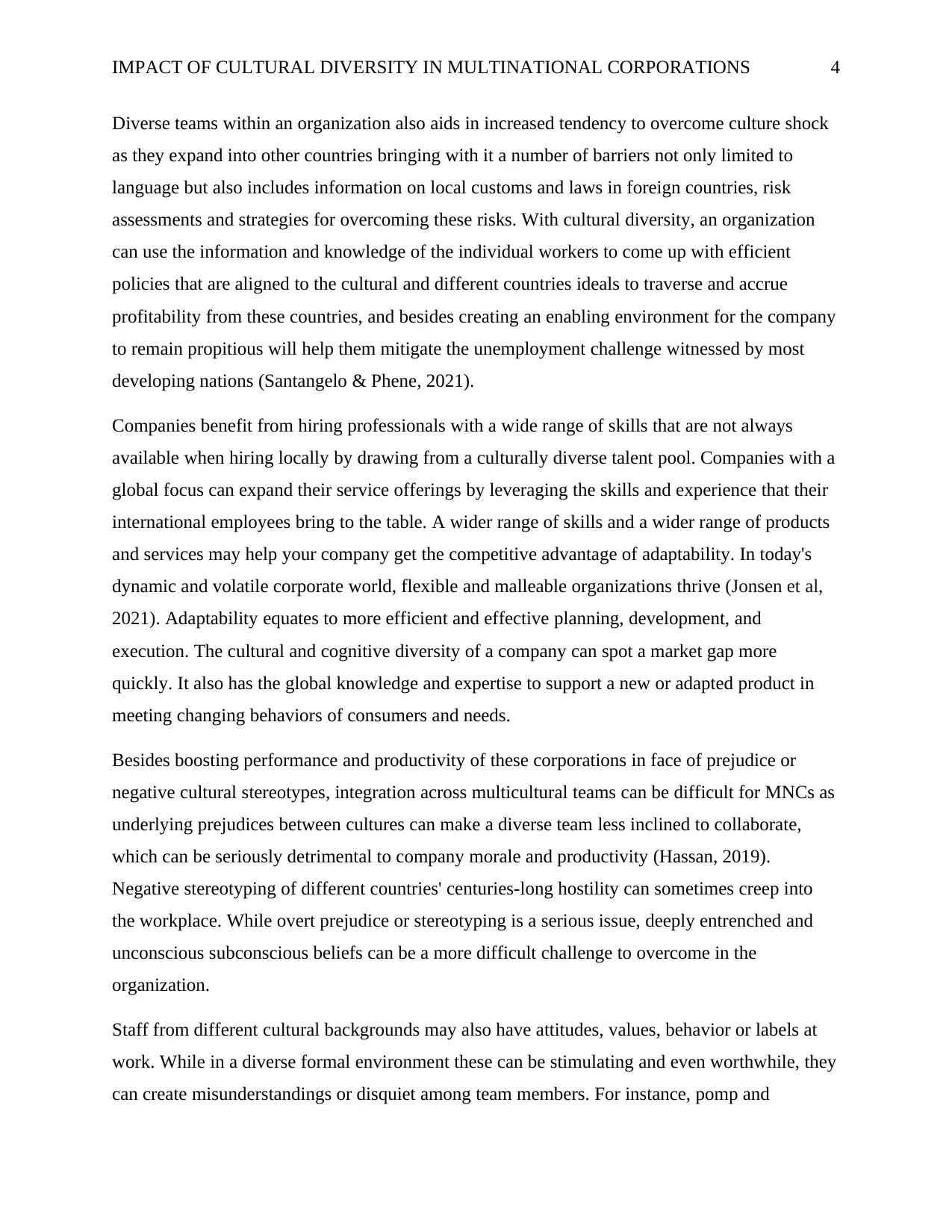
IMPACT OF CULTURAL DIVERSITY IN MULTINATIONAL CORPORATIONS 4
Diverse teams within an organization also aids in increased tendency to overcome culture shock
as they expand into other countries bringing with it a number of barriers not only limited to
language but also includes information on local customs and laws in foreign countries, risk
assessments and strategies for overcoming these risks. With cultural diversity, an organization
can use the information and knowledge of the individual workers to come up with efficient
policies that are aligned to the cultural and different countries ideals to traverse and accrue
profitability from these countries, and besides creating an enabling environment for the company
to remain propitious will help them mitigate the unemployment challenge witnessed by most
developing nations (Santangelo & Phene, 2021).
Companies benefit from hiring professionals with a wide range of skills that are not always
available when hiring locally by drawing from a culturally diverse talent pool. Companies with a
global focus can expand their service offerings by leveraging the skills and experience that their
international employees bring to the table. A wider range of skills and a wider range of products
and services may help your company get the competitive advantage of adaptability. In today's
dynamic and volatile corporate world, flexible and malleable organizations thrive (Jonsen et al,
2021). Adaptability equates to more efficient and effective planning, development, and
execution. The cultural and cognitive diversity of a company can spot a market gap more
quickly. It also has the global knowledge and expertise to support a new or adapted product in
meeting changing behaviors of consumers and needs.
Besides boosting performance and productivity of these corporations in face of prejudice or
negative cultural stereotypes, integration across multicultural teams can be difficult for MNCs as
underlying prejudices between cultures can make a diverse team less inclined to collaborate,
which can be seriously detrimental to company morale and productivity (Hassan, 2019).
Negative stereotyping of different countries' centuries-long hostility can sometimes creep into
the workplace. While overt prejudice or stereotyping is a serious issue, deeply entrenched and
unconscious subconscious beliefs can be a more difficult challenge to overcome in the
organization.
Staff from different cultural backgrounds may also have attitudes, values, behavior or labels at
work. While in a diverse formal environment these can be stimulating and even worthwhile, they
can create misunderstandings or disquiet among team members. For instance, pomp and
Diverse teams within an organization also aids in increased tendency to overcome culture shock
as they expand into other countries bringing with it a number of barriers not only limited to
language but also includes information on local customs and laws in foreign countries, risk
assessments and strategies for overcoming these risks. With cultural diversity, an organization
can use the information and knowledge of the individual workers to come up with efficient
policies that are aligned to the cultural and different countries ideals to traverse and accrue
profitability from these countries, and besides creating an enabling environment for the company
to remain propitious will help them mitigate the unemployment challenge witnessed by most
developing nations (Santangelo & Phene, 2021).
Companies benefit from hiring professionals with a wide range of skills that are not always
available when hiring locally by drawing from a culturally diverse talent pool. Companies with a
global focus can expand their service offerings by leveraging the skills and experience that their
international employees bring to the table. A wider range of skills and a wider range of products
and services may help your company get the competitive advantage of adaptability. In today's
dynamic and volatile corporate world, flexible and malleable organizations thrive (Jonsen et al,
2021). Adaptability equates to more efficient and effective planning, development, and
execution. The cultural and cognitive diversity of a company can spot a market gap more
quickly. It also has the global knowledge and expertise to support a new or adapted product in
meeting changing behaviors of consumers and needs.
Besides boosting performance and productivity of these corporations in face of prejudice or
negative cultural stereotypes, integration across multicultural teams can be difficult for MNCs as
underlying prejudices between cultures can make a diverse team less inclined to collaborate,
which can be seriously detrimental to company morale and productivity (Hassan, 2019).
Negative stereotyping of different countries' centuries-long hostility can sometimes creep into
the workplace. While overt prejudice or stereotyping is a serious issue, deeply entrenched and
unconscious subconscious beliefs can be a more difficult challenge to overcome in the
organization.
Staff from different cultural backgrounds may also have attitudes, values, behavior or labels at
work. While in a diverse formal environment these can be stimulating and even worthwhile, they
can create misunderstandings or disquiet among team members. For instance, pomp and
Paraphrase This Document
Need a fresh take? Get an instant paraphrase of this document with our AI Paraphraser
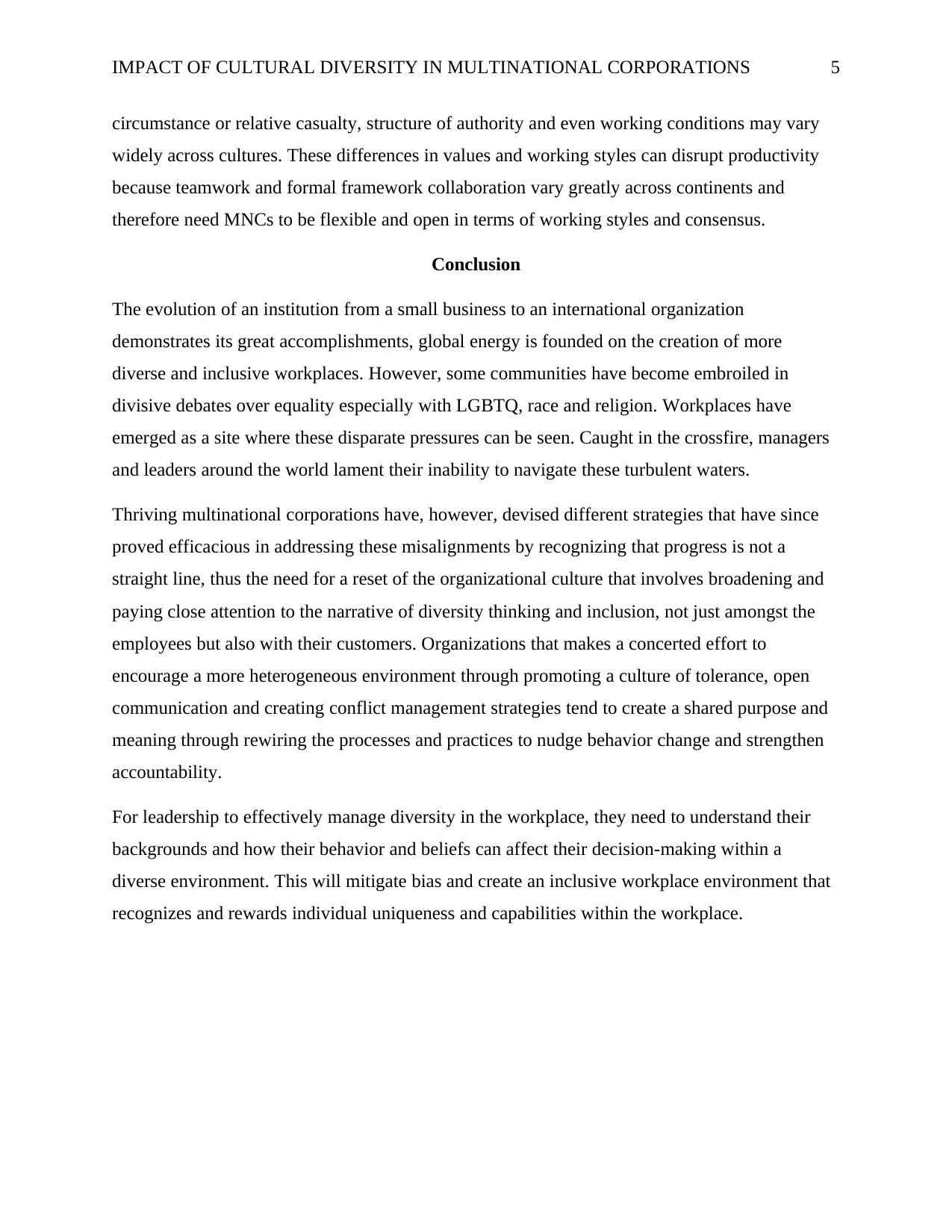
IMPACT OF CULTURAL DIVERSITY IN MULTINATIONAL CORPORATIONS 5
circumstance or relative casualty, structure of authority and even working conditions may vary
widely across cultures. These differences in values and working styles can disrupt productivity
because teamwork and formal framework collaboration vary greatly across continents and
therefore need MNCs to be flexible and open in terms of working styles and consensus.
Conclusion
The evolution of an institution from a small business to an international organization
demonstrates its great accomplishments, global energy is founded on the creation of more
diverse and inclusive workplaces. However, some communities have become embroiled in
divisive debates over equality especially with LGBTQ, race and religion. Workplaces have
emerged as a site where these disparate pressures can be seen. Caught in the crossfire, managers
and leaders around the world lament their inability to navigate these turbulent waters.
Thriving multinational corporations have, however, devised different strategies that have since
proved efficacious in addressing these misalignments by recognizing that progress is not a
straight line, thus the need for a reset of the organizational culture that involves broadening and
paying close attention to the narrative of diversity thinking and inclusion, not just amongst the
employees but also with their customers. Organizations that makes a concerted effort to
encourage a more heterogeneous environment through promoting a culture of tolerance, open
communication and creating conflict management strategies tend to create a shared purpose and
meaning through rewiring the processes and practices to nudge behavior change and strengthen
accountability.
For leadership to effectively manage diversity in the workplace, they need to understand their
backgrounds and how their behavior and beliefs can affect their decision-making within a
diverse environment. This will mitigate bias and create an inclusive workplace environment that
recognizes and rewards individual uniqueness and capabilities within the workplace.
circumstance or relative casualty, structure of authority and even working conditions may vary
widely across cultures. These differences in values and working styles can disrupt productivity
because teamwork and formal framework collaboration vary greatly across continents and
therefore need MNCs to be flexible and open in terms of working styles and consensus.
Conclusion
The evolution of an institution from a small business to an international organization
demonstrates its great accomplishments, global energy is founded on the creation of more
diverse and inclusive workplaces. However, some communities have become embroiled in
divisive debates over equality especially with LGBTQ, race and religion. Workplaces have
emerged as a site where these disparate pressures can be seen. Caught in the crossfire, managers
and leaders around the world lament their inability to navigate these turbulent waters.
Thriving multinational corporations have, however, devised different strategies that have since
proved efficacious in addressing these misalignments by recognizing that progress is not a
straight line, thus the need for a reset of the organizational culture that involves broadening and
paying close attention to the narrative of diversity thinking and inclusion, not just amongst the
employees but also with their customers. Organizations that makes a concerted effort to
encourage a more heterogeneous environment through promoting a culture of tolerance, open
communication and creating conflict management strategies tend to create a shared purpose and
meaning through rewiring the processes and practices to nudge behavior change and strengthen
accountability.
For leadership to effectively manage diversity in the workplace, they need to understand their
backgrounds and how their behavior and beliefs can affect their decision-making within a
diverse environment. This will mitigate bias and create an inclusive workplace environment that
recognizes and rewards individual uniqueness and capabilities within the workplace.
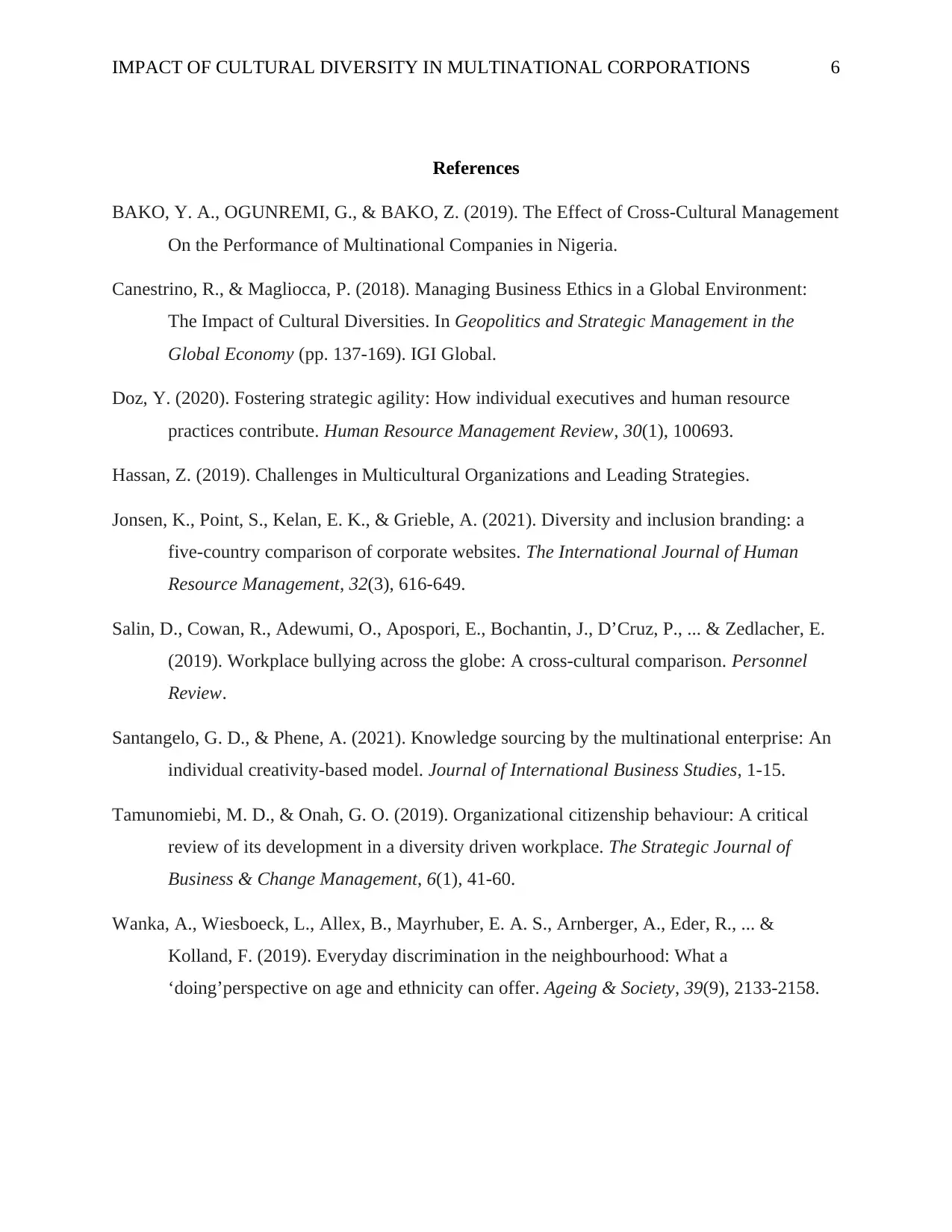
IMPACT OF CULTURAL DIVERSITY IN MULTINATIONAL CORPORATIONS 6
References
BAKO, Y. A., OGUNREMI, G., & BAKO, Z. (2019). The Effect of Cross-Cultural Management
On the Performance of Multinational Companies in Nigeria.
Canestrino, R., & Magliocca, P. (2018). Managing Business Ethics in a Global Environment:
The Impact of Cultural Diversities. In Geopolitics and Strategic Management in the
Global Economy (pp. 137-169). IGI Global.
Doz, Y. (2020). Fostering strategic agility: How individual executives and human resource
practices contribute. Human Resource Management Review, 30(1), 100693.
Hassan, Z. (2019). Challenges in Multicultural Organizations and Leading Strategies.
Jonsen, K., Point, S., Kelan, E. K., & Grieble, A. (2021). Diversity and inclusion branding: a
five-country comparison of corporate websites. The International Journal of Human
Resource Management, 32(3), 616-649.
Salin, D., Cowan, R., Adewumi, O., Apospori, E., Bochantin, J., D’Cruz, P., ... & Zedlacher, E.
(2019). Workplace bullying across the globe: A cross-cultural comparison. Personnel
Review.
Santangelo, G. D., & Phene, A. (2021). Knowledge sourcing by the multinational enterprise: An
individual creativity-based model. Journal of International Business Studies, 1-15.
Tamunomiebi, M. D., & Onah, G. O. (2019). Organizational citizenship behaviour: A critical
review of its development in a diversity driven workplace. The Strategic Journal of
Business & Change Management, 6(1), 41-60.
Wanka, A., Wiesboeck, L., Allex, B., Mayrhuber, E. A. S., Arnberger, A., Eder, R., ... &
Kolland, F. (2019). Everyday discrimination in the neighbourhood: What a
‘doing’perspective on age and ethnicity can offer. Ageing & Society, 39(9), 2133-2158.
References
BAKO, Y. A., OGUNREMI, G., & BAKO, Z. (2019). The Effect of Cross-Cultural Management
On the Performance of Multinational Companies in Nigeria.
Canestrino, R., & Magliocca, P. (2018). Managing Business Ethics in a Global Environment:
The Impact of Cultural Diversities. In Geopolitics and Strategic Management in the
Global Economy (pp. 137-169). IGI Global.
Doz, Y. (2020). Fostering strategic agility: How individual executives and human resource
practices contribute. Human Resource Management Review, 30(1), 100693.
Hassan, Z. (2019). Challenges in Multicultural Organizations and Leading Strategies.
Jonsen, K., Point, S., Kelan, E. K., & Grieble, A. (2021). Diversity and inclusion branding: a
five-country comparison of corporate websites. The International Journal of Human
Resource Management, 32(3), 616-649.
Salin, D., Cowan, R., Adewumi, O., Apospori, E., Bochantin, J., D’Cruz, P., ... & Zedlacher, E.
(2019). Workplace bullying across the globe: A cross-cultural comparison. Personnel
Review.
Santangelo, G. D., & Phene, A. (2021). Knowledge sourcing by the multinational enterprise: An
individual creativity-based model. Journal of International Business Studies, 1-15.
Tamunomiebi, M. D., & Onah, G. O. (2019). Organizational citizenship behaviour: A critical
review of its development in a diversity driven workplace. The Strategic Journal of
Business & Change Management, 6(1), 41-60.
Wanka, A., Wiesboeck, L., Allex, B., Mayrhuber, E. A. S., Arnberger, A., Eder, R., ... &
Kolland, F. (2019). Everyday discrimination in the neighbourhood: What a
‘doing’perspective on age and ethnicity can offer. Ageing & Society, 39(9), 2133-2158.
⊘ This is a preview!⊘
Do you want full access?
Subscribe today to unlock all pages.

Trusted by 1+ million students worldwide
1 out of 6
Related Documents
Your All-in-One AI-Powered Toolkit for Academic Success.
+13062052269
info@desklib.com
Available 24*7 on WhatsApp / Email
![[object Object]](/_next/static/media/star-bottom.7253800d.svg)
Unlock your academic potential
Copyright © 2020–2026 A2Z Services. All Rights Reserved. Developed and managed by ZUCOL.





